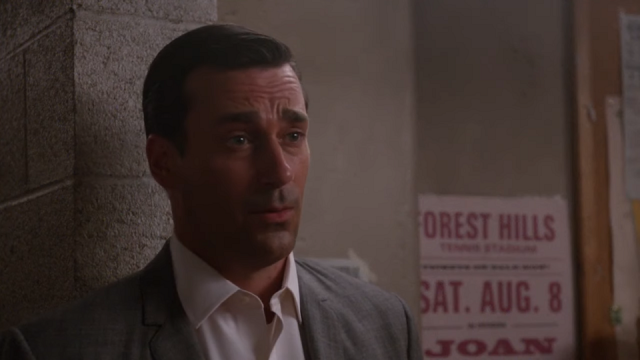My definitive scene of Don Draper – the one that shows why I find him so compelling – is not any of the famous ones. “This never happened. It will shock you how much it never happened,” is a great poetic compression of his worldview, a great moment of him connecting with Peggy, and a great setup for Peggy’s refusal to embrace it. His pitch of The Wheel shows off his mad skills and how they come from an honest channeling of his emotions, as well as being a poignant expression of nostalgia. “Mr Campbell, who cares?” is a great scene, but it’s not really about Don – it’s about the idea of him and what he represents to everyone else. Betty confronting Don over his past shows the mask of Fifties Dad falling from his face and reveals the terror and anxiety hiding underneath at all times; it’s perhaps Jon Hamm’s finest acting moment in the series. “Shut The Door. Have A Seat” owns and owns hard. But the scene I always think of first when I think of Don, the scene that makes me want to follow him and sympathise with him and hope that he finds happiness is in “Tea Leaves”, when he’s backstage at a Rolling Stones concert.
I understand why certain people get frustrated when someone says that Don is cool, but they’re wrong because he’s very cool. The core of Don’s problem – to which his drinking, his addictions, and his emotional abuse are symptoms – is that he wants to be able to empathise with others but doesn’t want others to be able to empathise with him. It’s a little bit of a power thing; he definitely can’t bring himself to be vulnerable with anyone other than Anna Draper, because then people can hurt him. You could also say that being able to empathise with others gives him the ability to control them, but that doesn’t sound right to me with Don. I think he’s genuinely interested in other people, in looking for ideas he can then interpolate with his own goals, and he wants to connect with other people. He’s simply too willing to let people be who they are for me to believe that he wants to control them; he’ll offer solutions to their problems but he won’t force them on them (see: his attempt to appeal to the jai alai guy), and he’s a genuine listener, something that goes all the way back to the very first scene and is articulated perfectly in this one.
(He’s none of these things with his wives, especially Betty)
Like many adults who love kids, I hate seeing adults condescend to them. At our worst – and I say ‘our’ because I have caught myself doing these things and regretted it every time – we can treat them as problems to be solved, whose every mood, knowledge gap, or perceived flaw is to be corrected by our wise and superior adulthood (Roald Dahl’s entire children’s bibliography is based on anger about that). Every day, children are barraged by commands disguised as advice. Don doesn’t do that here; in fact, he barrages her with questions and asks her to expand on her answers, and the fact that he’s asking her because it ties into his job does not undo the sincerity of his curiosity or his willingness to accept her answers and take them seriously on their own terms. Perhaps this is why people need a job to do, not because work is inherently meaningful but because when you have a problem to filter the world through, you can filter the whole world through it. She picks up on his curiosity and the fact that he’s completely uninterested in making her do anything, and she opens up to him.
Don returns that honesty with his own honesty. It starts with the fact that he doesn’t hide how out-of-place he is; he doesn’t downplay his Madison Avenue values or try to fit in with the kids. He also doesn’t go the other way, amplifying the mask to stress that he doesn’t belong here. He doesn’t turn down the joint to wag his finger at the kids – though I don’t think he’s happy about them smoking – he just doesn’t feel like it. Beloved Soluter ZoeZ has noted that Don has a complete lack of pretension, something that’s present in both his art and his conversations. This lets him get through to her in a way her parents, her teachers, and her priest probably never have with a statement from the heart that perfectly summarises our feelings about the youth, and in a way that’s neither judgmental nor hiding the reality of the situation (“We’re worried about you.”). She can do whatever she wants, and what she’s doing is frightening people who love her. Maybe that’s the secret to being cool – to empathise and allow empathy.

